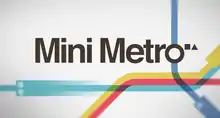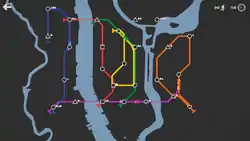Mini Metro (video game)
Mini Metro is a puzzle strategy video game developed by indie development team Dinosaur Polo Club. Players are tasked with constructing an efficient rail transit network for a rapidly growing city. Stations are represented by differently shaped nodes and players can build tracks to connect them by drawing lines. Levels are based on real cities and the appearance of stations and passengers is procedurally generated. The game's visual style makes use of bold colours and simple geometry to replicate the appearance of modern transit maps. The game uses a procedural audio system to generate sounds based on the player actions and transit network. The rhythms and sounds created took inspiration from works of minimal music.
| Mini Metro | |
|---|---|
 | |
| Developer(s) | Dinosaur Polo Club |
| Publisher(s) | Dinosaur Polo Club, Playdigious (Android) |
| Designer(s) |
|
| Programmer(s) |
|
| Artist(s) | Jamie Churchman |
| Composer(s) | Disasterpeace |
| Engine | Unity |
| Platform(s) | Browser, Linux, macOS, Windows, Android, iOS, Nintendo Switch, PlayStation 4 |
| Release |
|
| Genre(s) | Puzzle, strategy |
| Mode(s) | Single-player, multiplayer |
Mini Metro was conceived in April 2013 for a video game development competition, with a prototype version being released freely for web browsers. During the game's conception phase, the developers imposed a set of constraints to limit its scope and ensure the project could reach a finished state. Production of the game continued following the event and an in-development version was released commercially on Linux, OS X, and Windows in August 2014. Mini Metro received its full release on PC platforms in November 2015, on Android and iOS platforms in October 2016, plus Nintendo Switch and PlayStation 4 ports in 2018 and 2019 respectively.
The game received a positive reception, with praise for its intuitive interface, simple gameplay, and minimalist approach.
Gameplay


Mini Metro is a puzzle strategy video game, in which players are tasked with building an efficient rail transit network for a rapidly growing city.[1] Each level is a flat depiction of a real city and begins with three train stations.[2][3] Train stations are represented by different shaped nodes.[2] Players can construct routes to link stations by drawing lines between them; each route has a different colour.[2][4] Passengers appear at stations, each denoted by a shape that identifies which station they want to travel to.[2] Trains travel along routes taking passengers to their desired stations.[4] Rivers, intersecting train lines and the appearance of more stations and passengers over time causes the transit network to become more complex and difficult to manage.[2][5] Common-shaped stations can also change their node shape into rarer ones.[2] The game's visual style is minimalist, employing straight lines and bold colours, similar to modern transit maps.[6]
In the "Normal" game mode, each station can accommodate a limited capacity of waiting passengers; if the stations become too congested and the threshold is reached, the level ends.[2] Upon failing, players can continue to build their network in the "Endless" game mode where stations do not have a limited capacity.[2] To alleviate the network's growth, players earn upgrades each week of in-game time.[1][2] At each upgrade, the player receives a new train car and a choice among two other random options such as an extra rail line, an extra train carriage, extra tunnels, or an interchange (which increases a station's capacity and allows trains to instantly load/unload passengers).[2] In addition, the transit simulation can be paused at any point to allow for reconstruction and adjustments to train routes.[4] In "Extreme" mode lines between stations cannot be adjusted once their position is set.[2][7]
In 2018 a "Creative" gamemode was added, which allows players to create, adjust and add stations in the game. This game mode is grid-based gives the player almost unlimited train cars, train carriages, tunnels or interchanges.
Development and release
Mini Metro was developed by Dinosaur Polo Club, a two-man independent video game development studio based in New Zealand.[8] It is the first game from the studio, which was founded in 2013 by brothers Peter and Robert Curry.[8][9] They had previously worked at video game developer Sidhe, but left in 2006 to pursue a career in developing indie games.[9] Following a series of abandoned projects, Peter Curry recognised that he would have to restrict the scope of his projects in order to complete them,[10] and with hopes of releasing a finished product, the brothers set a number of constraints while proposing ideas for a prototype game.[9][10] Minimising the amount of production art was a necessary restriction, as they had little experience in creating art assets.[9][10] Likewise, they did not want the game's concept to rely on audio content, due to lack of skills in producing music.[10] They also did not want to hand-build each level in the game.[10] Imposing these constraints meant that they could discard most of their potential game ideas immediately, and led to them concentrating on concepts that involved procedurally generated levels and abstract visual styles.[10]
Development of Mini Metro began in April 2013, under the title Mind the Gap.[9][10] Robert Curry suggested building a mass transit navigation game after visiting London and using its Underground system.[9] The concept was to let the player build a transit system that navigates intelligent agents around, with nodes and lines representing train stations and tracks respectively.[9] It was prototyped over a weekend, and entered in the Ludum Dare 26 video game development competition.[10] They chose to develop the game using the Unity game engine.[10] The Unity Web Player allowed them to release a freely playable web browser version of the prototype during the competition, so more people would have access to play it.[10] Mind the Gap was ranked number 1 in the "Innovation" category and number 7 in the "Overall" category during the competition.[8] Part-time development on the game continued after the event concluded.[9]

In September 2013, the first playable alpha version of Mini Metro was released.[10] They decided to keep the web version of the game freely available, at least until the release of the final game.[10] They also submitted Mini Metro on Steam Greenlight, a community voting system that allows games to be released on digital distribution service Steam.[10] Initially, they intended on releasing the final version of the game by the end of 2013, however despite the game's limited scope, development took far longer than they had expected.[10] A graphical overhaul, issues within the game's balance, and scheduling someone to work on the game's audio contributed to its delay.[10] In August 2014, they decided to release an in-development version of the game commercially through Steam Early Access.[10][4] They felt that the early access model was suitable for Mini Metro because the game was designed to have replay value and there was no fixed narrative to be spoiled.[10] They continually released new builds of the game based on the community's feedback.[10] The early access release provided them with funds to work full-time on the game. Peter Curry had been working on Mini Metro full-time since March 2014, and his brother Robert started working full-time in November 2014.[9] Originally Mini Metro was being built for mobile platforms, however they shifted their focus to desktop PCs because of the ability to release their game in the early access state.[10]
The brothers hired external help to address two of their initial issues: art and audio.[10] Jamie Churchman, a former colleague at Sidhe, oversaw the visual design for Mini Metro and also contributed to the game design.[9][10] They approached American composer Disasterpeace to work on the game's audio.[10] He developed a procedural audio system that would generate sounds based on events in the game.[10][11] Each level in the game has a corresponding set of rhythms and sounds; the harmonic structure of these elements changes based on the size and shape of the player's subways system.[12] The audio was inspired by minimalism and the works of Philip Glass and Steve Reich.[12]
On 6 November 2015, Mini Metro was released out of early access for Linux, OS X, and Windows.[13][14] Dinosaur Polo Club partnered with Playism and Plug In Digital to release the game on digital storefronts, and Koch Media to distribute the game in retail stores in Europe.[15] A version for Android (published by Playdigious[16]) and for iOS were released on 18 October 2016.[17] The game's release on 30 August 2018 for the Nintendo Switch also added a multiplayer mode exclusive to the platform.[18] A PlayStation 4 port was released on 10 September 2019.[19]
Reception
| Aggregator | Score |
|---|---|
| Metacritic | PC: 77/100[20] iOS: 89/100[21] NS: 86/100[22] |
| Publication | Score |
|---|---|
| GamesTM | 7/10[1] |
| Gamezebo | |
| Pocket Gamer | 8/10[23] |
| TouchArcade | |
| Kill Screen | 83/100[3] |
Mini Metro received "generally favourable" reception from critics according to aggregate review website Metacritic.[20][21] Technology Tell writer, Jenni Lada described Mini Metro as "aesthetically pleasing" and found playing the game an oddly relaxing experience, despite the game's attempt to put the player under pressure.[25] Lena LeRay, of IndieGames.com, also felt that Mini Metro had a relaxing tone and complimented its intuitive interface.[2] LeRay appreciated changes that were made during the early access phase, noting that audio and the Daily Challenge mode were welcome additions, and the interface improvements had diminished her initial complaints about the game.[2] Reviewing the PC version, GamesTM thought that the depth of Mini Metro's gameplay along with the difficulty scaling kept the game interesting.[1] However, they did question why the game hadn't been released for smartphones yet, pointing out that such devices would be suited for the game's simple interface.[1] Kill Screen editor, Ethan Gach commended the game for its simplicity and elegance, having combined interactive aesthetics with a robust simulation.[3] Alec Meer of Rock, Paper, Shotgun praised the game for being a "mesmerising challenge of logic and aesthetics".[4] He particularly enjoyed how beautifully the gameplay descended into chaos as the difficulty gradually increased, calling it "elegant even in disaster". He also thought that Mini Metro was a good example of how to release game in early access.[4] Reviewing the mobile version, Gamezebo writer Rob Rich commended the visual design and intuitive touch controls. He thought that the use of geometric shapes to represent commuters and stations helped simplify the complicated tasks, resulting in an accessible game.[7] Pocket Gamer reviewer Christian Valentin remarked that the game felt confusing early on but became "surprisingly engaging".[23]
At the 2016 Independent Games Festival, Mini Metro won an award for "Excellence in Audio",[26] and was nominated for awards in three other categories: "Excellence in Visual Art", "Excellence in Design", and the "Seumas McNally Grand Prize".[27] Mini Metro also received a nomination for "Debut Game" at the 12th British Academy Games Awards,[28] and received an honourable mention for "Best Debut" at the 16th Annual Game Developers Choice Awards.[29] GameSpot listed Mini Metro in their best five mobile games of 2016.[30]
References
- "Mini Metro review". GamesTM. Imagine Publishing. 15 February 2016. Archived from the original on 19 June 2016. Retrieved 9 July 2016.
- LeRay, Lena (9 November 2015). "Relax and make your own Mini Metro". IndieGames.com. UBM. Archived from the original on 12 December 2015. Retrieved 9 July 2016.
- Gach, Ethan (24 November 2015). "Mini Metro makes mass transportation sublime". Kill Screen. Kill Screen. Archived from the original on 9 July 2016. Retrieved 9 July 2016.
- Meer, Alec (26 August 2014). "Impressions: Mini Metro". Rock, Paper, Shotgun. Rock, Paper, Shotgun. Archived from the original on 10 April 2016. Retrieved 9 July 2016.
- Maiberg, Emanuel (18 August 2014). "Mini Metro turns the headache of mass transportation into fun". Kill Screen. Kill Screen. Archived from the original on 9 July 2016. Retrieved 9 July 2016.
- "Learn the science of the subway in Mini Metro". Kill Screen. Kill Screen. 12 November 2015. Archived from the original on 20 February 2016. Retrieved 9 July 2016.
- Rich, Rob (20 October 2016). "Mini Metro Review: Mass Transit Brain Teaser". Gamezebo. Gamezebo. Archived from the original on 25 October 2016. Retrieved 24 December 2016.
- "Dinosaur Polo Club Presskit()". Dinosaur Polo Club. Dinosaur Polo Club. Archived from the original on 18 March 2016. Retrieved 9 July 2016.
- Warwo, Alex (18 January 2016). "Road to the IGF: Dinosaur Polo Club's Mini Metro". Gamasutra. UBM. Archived from the original on 17 May 2016. Retrieved 9 July 2016.
- Curry, Peter (15 June 2016). "Postmortem: Dinosaur Polo Club's Mini Metro". Gamasutra. UBM. Archived from the original on 16 June 2016. Retrieved 9 July 2016.
- "Disasterpeace on composing music for indie classics". GamesTM. Imagine Publishing. 7 September 2015. Archived from the original on 21 February 2016. Retrieved 9 July 2016.
- Gould, Richard (18 February 2016). "The Programmed Music of "Mini Metro" – Interview with Rich Vreeland (Disasterpeace)". Designing Sound. Designing Sound. Archived from the original on 26 April 2016. Retrieved 9 July 2016.
- Smith, Graham (7 October 2015). "Mini Metro Departs Early Access On November 6th". Rock, Paper, Shotgun. Rock, Paper, Shotgun. Archived from the original on 28 April 2016. Retrieved 9 July 2016.
- O'Connor, Alice (9 November 2015). "Good Service: Mini Metro Launches Out Of Early Access". Rock, Paper, Shotgun. Rock, Paper, Shotgun. Archived from the original on 14 April 2016. Retrieved 9 July 2016.
- "What we've been up to". Dinosaur Polo Club. Dinosaur Polo Club. 27 May 2016. Archived from the original on 9 July 2016. Retrieved 9 July 2016.
- Dinosaur Polo Club on Twitter, "We’re stoked to be working with Playdigious on Mini Metro! They’re working to make sure we have the best possible Android release.", 28 September 2016.
- Valentin, Christian (11 October 2016). "[Update] Public transportation puzzler Mini Metro will coming to iOS and Android on October 18th". Pocket Gamer. Steel Media. Archived from the original on 16 October 2016. Retrieved 16 October 2016.
- "Mini Metro launches on Switch with console-exclusive multiplayer". VentureBeat. 30 August 2018. Retrieved 2 September 2018.
- "Sublime Subway Simulator Mini Metro Arrives on PS4 September 10". PlayStation Blog. Retrieved 10 September 2019.
- "Mini Metro for PC Reviews". Metacritic. CBS Interactive. Archived from the original on 18 June 2016. Retrieved 9 July 2016.
- "Mini Metro for iPhone/iPad Reviews". Metacritic. CBS Interactive. Archived from the original on 24 December 2016. Retrieved 21 September 2018.
- "Mini Metro for Switch Reviews". Metacritic. CBS Interactive. Retrieved 21 September 2018.
- Valentin, Christian (18 October 2016). "Mini Metro review - A smart and satisfying transportation puzzler". Pocket Gamer. Steel Media. Archived from the original on 24 December 2016. Retrieved 24 December 2016.
- Musgrave, Shaun (30 December 2016). "'Mini Metro' Review – Train Braining". TouchArcade. Retrieved 21 September 2018.
- Lada, Jenni (13 October 2014). "Mini Metro Preview: Stress-free subway". Technology Tell. GadgeTell. Archived from the original on 9 July 2016. Retrieved 9 July 2016.
- Brightman, James (17 March 2016). "Her Story dominates GDC, IGF Awards". Gamesindustry.biz. Gamer Network. Archived from the original on 21 April 2016. Retrieved 9 July 2016.
- "2016 Independent Games Festival debuts finalists". Gamasutra. UBM. 6 January 2016. Archived from the original on 5 April 2016. Retrieved 9 July 2016.
- Kerr, Chris (10 March 2016). "Everybody's Gone to the Rapture leads BAFTA nominations". Gamasutra. UBM. Archived from the original on 4 April 2016. Retrieved 9 July 2016.
- "16th Annual Game Developers Choice Awards". Game Developers Choice Awards. UBM. Archived from the original on 1 April 2016. Retrieved 9 July 2016.
- "The Best Mobile Games of 2016". GameSpot. CBS Interactive. Archived from the original on 24 December 2016. Retrieved 24 December 2016.